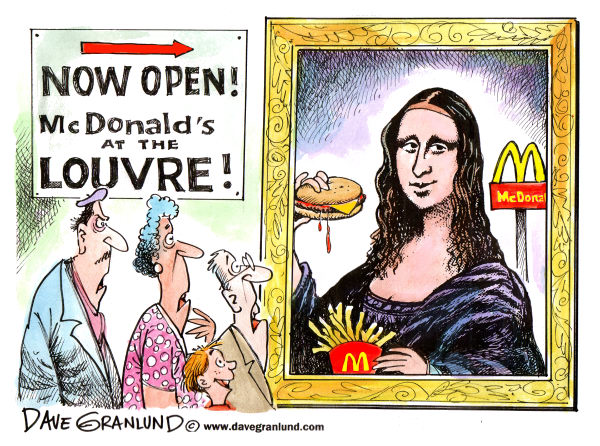Search
Democracy Links
Member's Off-site Blogs
the art of greed .....

It has tried every avenue of marketing, from TV ads to sponsorship of sport. Now McDonald's is opening up a new front: its own TV show.
The fast food giant has funded a documentary about itself that will air on prime-time television in a move that blurs the lines between advertising and programming.
In what is understood to be a first for the fast food chain globally, and a rarity for Australian commercial TV, the company has paid an independent production company to make a film it hopes will dispel any lingering myths about the quality and provenance of its food.
McDonald's Gets Grilled airs on Channel Seven on Monday night, straight after Revenge which attracts about 2 million viewers.
The film is the boldest example yet of a growing genre: programs funded by advertisers that help content-hungry TV stations fill their schedules. McDonald's and WTFN, which also makes the hit series Bondi Vet, insist the show is not an ad, a view challenged by some producers.
They say it is an ''access all areas investigation'' that puts the McDonald's business under the ''microscope''. It follows six volunteers as they visit suppliers nominated by the company, including small vegetable farmers in Victoria and NSW, as well as chicken giant Ingham and frozen food company McCain.
McDonald's insists it did not impose any editorial control and the people recruited by WTFN were unaware of the program's nature until shooting began. The only payment they received was a daily allowance.
The McDonald's chief executive, Catriona Noble , said the show was an exercise in citizen journalism and a chance for people ''to ask the tough questions and get honest answers, independently of McDonald's''.
She said it did not consider allowing a current affairs filmmaker access because the public was more likely to relate to people like themselves than journalists.
But it is the disclosure of the relationship that is likely to be the most contentious issue.
In the film's opening minute, the host Steve Liebmann says that ''McDonald's commissioned an independent production company'' and Channel Seven is planning its own disclosure.
But because Channel Seven did not pay for the program, nor was it paid by McDonald's, the program isn't covered by the TV industry's code of practice and the media regulator, the Australian Communications and Media Authority, would not comment until it had seen the show.
A Seven spokesman, Simon Francis, said there was no connection between the film's screening and the fact the company is a major advertiser on Seven; the company spends $33 million a year on ads across all media.
The body representing production companies was in no doubt: ''From our point of view, it's an advertorial and not a documentary,'' Geoff Brown, the executive director of the Screen Producers Association of Australia, said.
McDonald's Finds Another Channel To Take Its Story To The Market
- By John Richardson at 31 Mar 2012 - 7:49am
- John Richardson's blog
- Login or register to post comments
Recent comments
11 hours 55 min ago
13 hours 48 min ago
14 hours 51 min ago
15 hours 23 min ago
16 hours 32 sec ago
16 hours 25 min ago
16 hours 35 min ago
17 hours 47 min ago
20 hours 9 min ago
1 day 5 hours ago